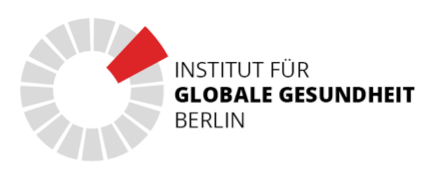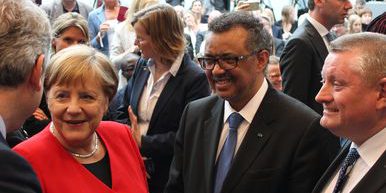Germany´s new role in Global Health – WHO´s best friend?
Just about a fortnight before the World Health Assembly, Germany´s chancellor Angela Merkel welcomed Dr Tedros, WHO´s Director General, at a Global Health conference hosted by the Christian Democratic Party (CDU) group in the German parliament in Berlin. In her speech she highlighted the need to strengthen multilateral cooperation in Global Health and development, thanking Dr Tedros for developing a „Global Action Plan for healthy lives and well-being for All“ jointly with the leaders of 12 Global Health organizations, like the World Bank, the Global Fund ATM and GAVI, the vaccine alliance. This had been requested by Prime Minister Erna Solberg of Norway, President Nana Addo Dankwa Akufo-Addo of Ghana and the German Chancellor in April 2018.
Dr Tedros presented a first draft of the action plan during the World Health Summit in Berlin last October. This SDG3 action plan is aiming at aligning cooperation among major Global Health organizations to help reach UN health targets. Tedros emphasized that: „fragmentation, duplication and inefficiency are undermining progress. We must do something differently.“ A number of NGOs criticized the lack of transparency and involvement of civil society organizations in the development of the Global SDG3 Action Plan. This criticism also used to be (or still is?) an issue in Germany´s Global Health policy development in the past.
But In February this year Germany launched its very own Global Health Hub, a national, multistakeholder platform to discuss current and emerging issues like Digital Health, AMR or NCDs. In addition, all of the already more than 200 members (individuals and organizations) are invited to suggest further topics for working groups and open dialogues in various formats. The Hub is financed – at least for its initial three years – by the German Ministry of Health, hosted by GIZ, Germany´s international development agency, and led by an interim leadership board with all stakeholder groups involved. Most of the hub´s members are from Germany, but international partners like the Bill and Melinda Gates Foundation and the Wellcome Trust are also welcomed to join. Both foundations have recently opened their own offices in Berlin and also have a seat in the Ministry of Health´s International Advisory Board (IAB).
Following a number of meetings since its inauguration in 2017, the IAB will be presenting its final report with recommendations for Germany´s Global Health Strategy in June. The development of the new strategy has begun a year ago including an extensive consultation process with a wide range of stakeholders. Lutz Stroppe, the Ministry of Health´s State Secretary, emphasized the importance of the strategy´s process in itself: „Our main objective is to support the 2030 Agenda, in particular the implementation of the health-related sustainable development goals, namely ensuring a healthy life for everybody through the lifecycle. Germany strongly advocates for the strengthening of the World Health Organization as the leading and coordinating global health institution. (…) But the strategy development process itself also adds value. It gives us the opportunity to further strengthen alliances with national and international partners.“ To support WHO the German Ministry of Health has committed an additional 150 Million Euros in voluntary, unspecified contributions to the organization´s programme of work.
In addition to the upcoming IAB´s report, key stakeholder groups presented position papers to support the development of Germany´s upcoming Global Health strategy. The Think Tank ´s position paper, which was coordinated by the Berlin Institute of Global Health, concluded that, despite all its activities and initiatives during the past years, Germany would still lag „behind the opportunities of a country that is so economically strong and so important in terms of foreign policy. (…)Health can be a unifying theme, mostly independent of political lines of conflict, and thus represents an essential basis for peace, prosperity and development for all.“ According to the group of Think Tanks, „Germany is perceived as an important and reliable player in international politics and supporters of multilateralism“. Therefore commitment for Global Health at the highest political level should now continue in the implementation process of the UN SDG agenda, at the High-Level Political fora of the UN (including the Security Council, where Germany currently holds a seat), in the WHO Executive Council (where Germany has a member since 2018) and also during the upcoming German EU Presidency in 2020. The authors also call for a closer cooperation with the European Commission and other European countries as an essential basis for Germany´s next Global Health strategy.
This approach will probably depend on the results of the upcoming European elections (EC/EP) and the Brexit process. What effect the Brexit might have on the field of Global Health is difficult to predict at this stage. A common European approach, including the United Kingdom, would certainly be better for all. This could be observed in many debates at previous World Health Assemblies as well. How Germany, the UK and other EU member states will position themselves individually and as part of the European Union will be one of the big questions during the upcoming WHA next week in Geneva. As Chancellor Merkel emphasized during her keynote at last week´s Global Health conference in Berlin: „Health is a collective task, both nationally and globally.(…) Joining forces, we can achieve a lot!“
(by Mathias Bonk)

